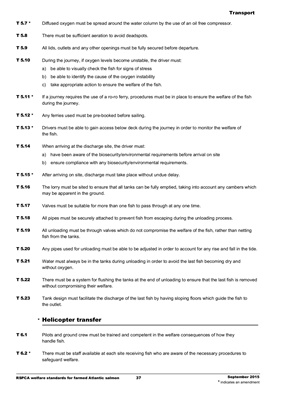
Transport
RSPCA welfare standards for farmed Atlantic salmon 37 September 2015
* indicates an amendment
T 5.7 * Diffused oxygen must be spread around the water column by the use of an oil free compressor.
T 5.8 There must be sufficient aeration to avoid deadspots.
T 5.9 All lids, outlets and any other openings must be fully secured before departure.
T 5.10 During the journey, if oxygen levels become unstable, the driver must:
a) be able to visually check the fish for signs of stress
b) be able to identify the cause of the oxygen instability
c) take appropriate action to ensure the welfare of the fish.
T 5.11 * If a journey requires the use of a ro-ro ferry, procedures must be in place to ensure the welfare of the fish
during the journey.
T 5.12 * Any ferries used must be pre-booked before sailing.
T 5.13 * Drivers must be able to gain access below deck during the journey in order to monitor the welfare of
the fish.
T 5.14 When arriving at the discharge site, the driver must:
a) have been aware of the biosecurity/environmental requirements before arrival on site
b) ensure compliance with any biosecurity/environmental requirements.
T 5.15 * After arriving on site, discharge must take place without undue delay.
T 5.16 The lorry must be sited to ensure that all tanks can be fully emptied, taking into account any cambers which
may be apparent in the ground.
T 5.17 Valves must be suitable for more than one fish to pass through at any one time.
T 5.18 All pipes must be securely attached to prevent fish from escaping during the unloading process.
T 5.19 All unloading must be through valves which do not compromise the welfare of the fish, rather than netting
fish from the tanks.
T 5.20 Any pipes used for unloading must be able to be adjusted in order to account for any rise and fall in the tide.
T 5.21 Water must always be in the tanks during unloading in order to avoid the last fish becoming dry and
without oxygen.
T 5.22 There must be a system for flushing the tanks at the end of unloading to ensure that the last fish is removed
without compromising their welfare.
T 5.23 Tank design must facilitate the discharge of the last fish by having sloping floors which guide the fish to
the outlet.
* Helicopter transfer
T 6.1 Pilots and ground crew must be trained and competent in the welfare consequences of how they
handle fish.
T 6.2 * There must be staff available at each site receiving fish who are aware of the necessary procedures to
safeguard welfare.